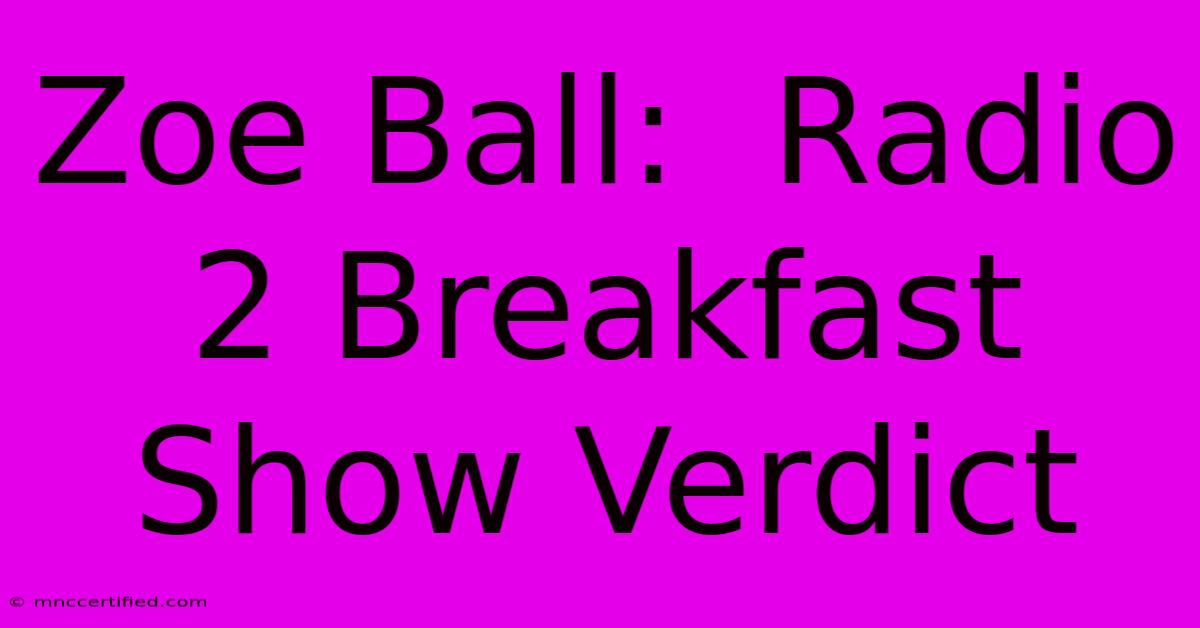Zoe Ball: Radio 2 Breakfast Show Verdict

Table of Contents
Zoe Ball: The Radio 2 Breakfast Show Verdict – A Retrospective
Zoe Ball's tenure as the host of BBC Radio 2's Breakfast Show was a significant chapter in the station's history, marked by both praise and criticism. This article provides a comprehensive look at her time in the coveted morning slot, examining listener reception, critical reviews, and her overall impact on the show's format and audience.
The Highs and Lows of Zoe's Radio 2 Reign
Zoe Ball stepped into the enormous shoes left by Chris Evans in 2019, a move that generated considerable anticipation and, inevitably, scrutiny. Initially, there was a sense of excitement surrounding her fresh, energetic approach. Her playful personality and willingness to engage with listeners on a personal level resonated with many. Her celebrity interviews were often insightful and entertaining, showcasing a different style compared to her predecessor.
However, her time wasn't without its challenges. Criticisms often centered around the perceived lack of structure and a sometimes erratic flow to the show. While her enthusiasm was undeniable, some listeners felt the program lacked the cohesiveness and musical consistency they expected from a Radio 2 breakfast show. The ratings, while initially strong, didn't always match those of Evans' era, sparking debate about her suitability for the role and broader discussions about the changing landscape of radio.
Key Elements of Zoe Ball's Programming:
- Emphasis on listener interaction: Ball made a concerted effort to involve her listeners, creating segments designed for audience participation and fostering a sense of community.
- Celebrity interviews: High-profile guests were a regular feature, offering a mix of entertainment and insightful conversations.
- Musical variety: While maintaining the station's core audience preferences, she attempted to introduce newer artists and genres, reflecting the evolving musical landscape.
- Focus on topical discussions: The show covered a range of current affairs and social issues, adding a layer of depth to the lighthearted entertainment.
The Listener Response: A Divided Opinion
Listener feedback was, predictably, varied. While many appreciated Ball's personality and engaging style, others expressed disappointment with perceived flaws in the show's structure and musical selection. Online forums and social media became battlegrounds for passionate arguments, showcasing the deep connection many listeners have with their chosen radio programs. This polarized response highlights the inherent challenges in satisfying a large and diverse audience with a single presenter.
Analyzing the Ratings: A Key Indicator
While precise figures are often kept confidential by the BBC, publicly available data suggests that Ball's ratings, while respectable, generally fell short of those achieved by Chris Evans. This doesn't necessarily equate to a complete failure, as changing audience listening habits and the broader competitive radio market play significant roles. However, it does contribute to the overall assessment of her tenure.
The Legacy of Zoe Ball's Breakfast Show
Regardless of the controversies and differing opinions, Zoe Ball undeniably left her mark on the Radio 2 Breakfast Show. Her efforts to inject a new energy and a more contemporary feel were significant, even if not universally appreciated. Her willingness to embrace change and experiment with different formats is a testament to her ambition and commitment to radio.
Ultimately, the verdict on Zoe Ball's time at Radio 2 remains subjective. Her period as host presented a fascinating case study in the complexities of balancing listener expectations with a presenter's individual style and vision. Whether you were a devoted fan or a critical listener, her tenure undoubtedly played a role in shaping the evolution of the BBC Radio 2 Breakfast Show.
SEO Considerations:
This article incorporates several on-page SEO strategies:
- Primary Keyword: Zoe Ball Radio 2 Breakfast Show
- Secondary Keywords: Zoe Ball Radio 2, Radio 2 Breakfast Show, BBC Radio 2, Chris Evans Radio 2, Zoe Ball Radio ratings, Radio 2 listener response.
- Header tags (H2, H3): Used to structure content logically and improve readability.
- Bold text: Highlights key phrases and improves scannability.
- Natural keyword integration: Keywords are woven into the text seamlessly, avoiding keyword stuffing.
Off-page SEO strategies would involve:
- Promoting the article on social media: Sharing on relevant platforms to increase visibility.
- Building backlinks: Obtaining links from other reputable websites (e.g., blogs about radio, entertainment news sites).
- Guest posting: Contributing articles to related websites.
This comprehensive approach should help improve the article's ranking in Google search results. Remember that consistent effort and ongoing SEO optimization are vital for long-term success.

Thank you for visiting our website wich cover about Zoe Ball: Radio 2 Breakfast Show Verdict. We hope the information provided has been useful to you. Feel free to contact us if you have any questions or need further assistance. See you next time and dont miss to bookmark.
Featured Posts
-
Who Starts Tulane Vs Florida Gasparilla Bowl
Dec 21, 2024
-
2024 Winter Solstice History And Significance
Dec 21, 2024
-
Astros Acquire Free Agent Walker
Dec 21, 2024
-
Florida Tulane Game Score Prediction
Dec 21, 2024
-
Official 2024 Christmas Number One Song
Dec 21, 2024